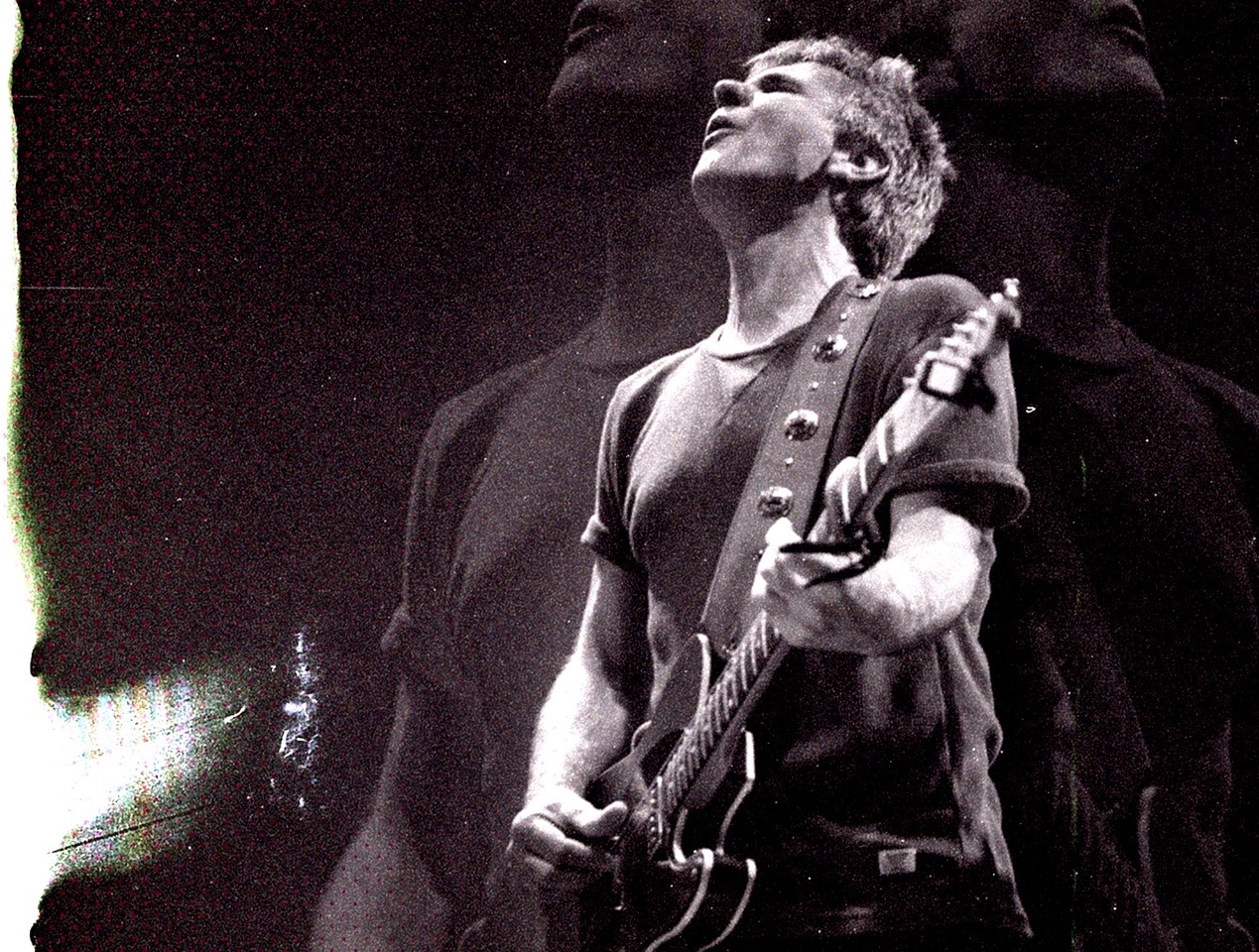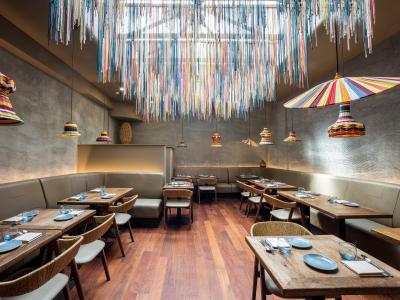Martin Rizzola: You’ve got an impressive career behind you. Despite the enormous success of Los Divididos and Gran Martell, you decided to take a step away, to follow your dream of being a singer/songwriter. What made you take that decision and head off on a solo career?
Jorge Araujo: Well, it wasn’t because of a spat or anything like that. I still have a very good relationship with Ricardo Mollo and Diego Arnedo (Los Divididos), we’re friends, and we respect each other as artists. My leaving the band had nothing to do with them. Anyone who knows me knows that there was something going round in my head, something I wanted to do that I couldn’t suppress, that wouldn’t be negotiable, that sooner or later, if I bottled it up, kept it to myself, I’d go crazy. If something’s eating away at you, you have to do it. You can’t keep it inside.
MR: So, you’re saying that you always wanted to sing…?
JA: That’s what Diego (Arnedo) told me the first time he saw me. And it’s true, that’s what was happening, except I didn’t realise it. For a long time, I had a battle with singing, for about twenty years, I didn’t want to sing. I realised later that I’d had a very strong connection with singing since I was a kid, but because I’d studied drumming nine hours a day, I ended up moving away from something that was natural for me. It’s hard to explain what happened to me when I split from the band. I knew I needed to do something different, but at the same time to try and keep my relationship with Diego and Ricardo. Luckily everything turned out well. Divididos is still going strong, and so am I.
MR: So, how does it feel being a solo artist after so many years with bands?
JA: Being in a band and being a solo artist are two radically different things. With Los Divididos and Gran Martell it was powerful and frenzied, and I had to sing and play drums no matter what song it was. But I really enjoy being alone out front, just me, a guitar, and a mic, being able to communicate directly with people. When I play the drums, I’m a very long way from the audience. As the front man it’s the opposite. And I love that.
MR: You say you like people to know you, limitations and all. Since this is the moment you bare all artistically, what do you want to express with this new album? What does the title ‘A un minuto de envejecer’ (which translates clumsily in English as something like ‘a minute away from getting old’) mean for you?
JA: That you leave nothing undone, because as time passes you’re always only a minute away from old age. Do everything you can now, while you really want to and are still able to. I’ve reached a time in my life when I couldn’t bear to leave behind something unfinished, something I actually could do. Obviously I had my doubts, I wondered whether I could get through a whole show with just me and my guitar. There was such tension in my early shows that you could see I was singing and playing the guitar at the very limit of my possibilities. Now I’ve done lots of shows, I’m much more relaxed
MR: For me this album is a pure, fresh and modern example of classic Argentine rock which was consolidated in the 80s and 90s by artists like Sumo, Charly García, Soda Stereo, Spinetta. For some years now, new generations of bands and solo artists in Argentina have opted for alternative genres and sounds, like Latin Trap, Reggaeton, or Indie. Do you think this means Argentine rock is changing its identity, or that it has been pushed aside by mass market, more popular genres?
JA: First of all, thanks for saying that about the album. It’s the best thing you can say to me because those are the artists that influenced me, along with a lot of British bands like The Beatles, Led Zeppelin, Genesis, etc. They introduced me to rock, they formed me. As for Argentine rock today, there are some great exponents that I really like. Like Ca7riel and Paco Amoroso, for example. Those kids just blow my mind. They are two incredible artists, unprejudiced, fun, they’ve got so much energy at live shows they make you want to jump. So, I don’t know what the genre is called, but with them the sensory part is very similar to what happens to me with a rock group. As for their attitude, they don’t pretend to be anything they’re not, they don’t adhere to any rules, on the contrary they’re very irreverent, rebellious, which I find amazing and totally follows from the Argentine rock tradition. I get the same vibe from Marilina Bertoldi.
MR: You think Argentine rock is still alive, then?
JA: Absolutely. With a more modern sound, of course.
MR: What do you think it is that gives Argentine rock its special character? What distinguishes it from other countries?
JA: In the case of the artists I mentioned before, they all have the quality of the sound, but also the energy, the irreverence. In my case, if you listen to ‘A un Minuto de Envejecer’, 60% of the album is quite quiet, but when you go and see the live show you find a situation of tremendous power and volume. So I think in part our rock is characterized by that power, that distortion, which sometimes makes it less easy on the ear. Life in Argentina is not quiet, and Argentine artists express that situation and feeling of instability inside their songs and musical creations.
MR: You say you were very influences by British bands, how did you get information about the British bands then?
JA: It was through the major record labels. I think it’s one of the few things I’m grateful to them for (laughs). As I said, British rock came to me through the Beatles. At five years old my parents could take me to a shop to buy one of their LPs. That was my first contact with British culture.
MR: You’ve obviously got an interesting connection with the UK. You recorded at Abbey Road Studios with Divididos, and you’ve also got family here. How did that come about?
JA: Well, the family link comes through my wife Pilar, who also sings in the band. Her aunt went to London when she was very young, in the era of Beatlemania. The children she had there are Pilar’s cousins. So we’ve been there a lot to see them and they also come here. Besides, everything to do with my love for British music comes from my fascination for the Beatles. When I was little, for me a present meant a Beatles LP. Don’t bother giving me a little car or any other toy. Even before I could read, I’d look at the faces on their album covers. After them, the influence of British rock kept making a deeper impression on me with artists like Pink Floyd, David Bowie and other bands of that generation which marked my childhood. One of the most important moments of my life was recording in Abbey Road. It was like a dream come true. And the other thing I loved about British rock was the humour and irony the bands had. I think they manage to combine a rebelliousness and irreverence with impressive quality, not overindulgent.
MR: Having worked with British sound engineer Barry Sage - who has collaborated with superstars like Rolling Stones, Elton John, Queen; recording with three drum kits simultaneously; what was the process like with your new solo album ‘A Un Minuto de Envejecer’?
JA: The creation and recording of this new album was much less thought out, more organic, cooked over a longer period of time. When I was with Gran Martell, I was already writing songs I didn’t think would work with the band. I used to pass them on to my friend Cesar Silva (our album’s producer). He offered to work on the songs in his studio. One day he showed me what he’d done with two of those songs, and I was gobsmacked. From then on, we began working together and composing what would eventually become my solo album. The vibe generated between us was really great, I felt completely free to experiment and continue recording the album during our sessions, taking my time, none of the pressure I had been under during the “4” album, when we only had two days in a studio.
Listen to Jorge Araujo’s music here
Listen to ‘A Un Minute de Envejecer’ here
















